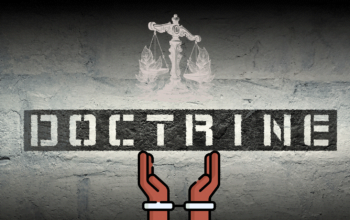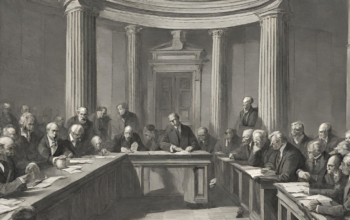Legal Literacy – This article explains the concept of individual and state responsibility in committing international crimes, which is based on the concept of international law.
Individual Accountability
A natural person or individual may be held liable if one of the following three conditions is met, namely: The individual intentionally commits, plans, assists or supports the planning, preparation of the criminal offence and is considered to be the perpetrator of the criminal offence. The individual is liable in accordance with the principle of individual responsibility for participation in a common plan to facilitate the commission of the criminal offence.
Individual criminal responsibility is a principle in international criminal law that has been consistently followed since it was affirmed by the International Military Tribunal in Nuremberg. This principle requires that perpetrators of international crimes bear personal responsibility for the international crimes they commit.
This also applies to international crimes committed communally or as a group, in that each individual who participates in the group crime remains individually culpable and individually accountable. The existence of this principle in international criminal law results in the invalidation of the privileges and immunities of formal office held by a head of state or other government official, so they must still be held accountable for their crimes. It is for the International Criminal Court (ICC) to exercise its jurisdiction over that person.
A person is criminally responsible and can be sentenced for a crime within the jurisdiction of the International Criminal Court (ICC) if the person:
- Committing an offence, either as an individual, jointly with another person or through another person regardless of whether that person is criminally responsible or not;
- Ordering, endeavouring or causing the commission of an offence in reality or in an attempt;
- Aiding, abetting or otherwise assisting the commission or attempted commission of an offence including providing the means for its commission.
Individual Liability Arrangements
The concept of individual responsibility is also contained in Article 6 paragraph (3) of the 1994 ICTR Statute entitled “individual criminal responsibility”, and Article 7 paragraph (3) and Article 25 of the Rome Statute of the International Criminal Court in 1998. Article 25 of the 1998 Rome Statute states that: the jurisdiction of the International Criminal Court is natural persons. A suspect within the jurisdiction of the Court is individually liable and punishable under the criminal provisions of the Rome Statute.
The principle of individual responsibility is also contained in Article 6 of the Statute of the International Military Tribunal ofurnberg, where the tribunal has the authority to try and punish any person who acts in the interests of the European Axis countries, either as an individual or as a member of a group, committing crimes against peace, war crimes and crimes against humanity.
In relation to the aspect of accountability of perpetrators of gross human rights violations, the Rome Statute regulates individual criminal responsibility, the exclusion of jurisdiction over persons under 18 (eighteen) years of age, the responsibility of commanders and other superiors, the mental condition of the perpetrator so that he is considered fit to be criminally responsible. The Rome Statute as a whole is set out in Article 25(3) and (4) of the 1998 Rome Statute on Individual Criminal Responsibility and Article 28 on the Responsibility of Commanders and Other Superiors.
State Accountability
The principle of state responsibility has not been regulated or codified in international law or treaties but is binding as a rule of international law on states. The unification of the discussion of state responsibility for international offences and crimes is done because the form of obligations imposed on the state in dealing with both types of international crimes is basically the same.
A state is held responsible for an international criminal offence if it fails to take measures to prevent, investigate, or extradite and punish individual perpetrators of international crimes, such as acts and matters relating to slavery, torture, piracy on the high seas, dangerous crimes on board aircraft, and so on. In this case, the state committed an act against international law that is classified as an international infraction. The state must also be liable for losses suffered by other states for tortious acts that harm other parties and occur within its jurisdiction.
Based on Bassiouni’s research, the types of international criminal offences that occur due to very high state involvement are aggression, war crimes, crimes against humanity, illegal use of weapons, genocide, apartheid and mercenarism. States must be held accountable for criminal offences that violate the most fundamental protections of the international community, namely international peace and security.
State responsibility for international criminal offences is grouped into two, namely:
- State responsibility for crimes that are not directly committed by the state (ordinary violations to international crimes), such as international offences and delicts;
- responsibility for international crimes that are planned, willed and committed by the state directly (extra-ordinary violations of international crimes).
The exhaustion of local remedies is a manifestation of state responsibility for international criminal offences. States are liable for international criminal offences essentially for the exercise of their national jurisdiction, whether on the basis of territorial, active or passive personal, and international criminal principles.
In addition, the implementation of state responsibility through international dispute settlement forums by international institutions or organisations, countermeasures, UN international dispute settlement, and self-defence of a state are regimes of state responsibility for international crimes.
The form of state responsibility for acts against international law is also through UN international dispute resolution, either by peaceful means, such as the case of “United States Diplomatic and Consular Staff in Tehran” or violence, such as the case of crimes against humanity and genocide committed by Yugoslavia against the people or civilian population of Kosovo.
Special international or national regulation on state responsibility in international criminal offences is needed considering that international criminal law and other regulations have not confirmed the state as a legal subject so that state responsibility is still not implemented properly. It can also make it easier to resolve problems related to international crimes committed by the full state.
Reference
- Cassese, Antonio. “On the Current Trends Towards Criminal Prosecution and Punishment of Breaches of International Humanitarian Law” Vol. 9 no. 1 (1998).
- Effendi, Tolib. International Criminal Law. Yogyakarta: Yustisia Library, 2014.
- Pasek Diantha, I Made. International Criminal Law in the Dynamics of the International Criminal Court. Jakarta: Prenadamedia Group, 2018.
- Starke, J.G. Introduction to International Law. London: Butterworths, 1967.
*This article is the author’s personal opinion and does not represent the views of the editorial team of Literasi Hukum Indonesia.






